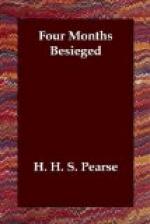object of giving medical care to any wounded enemies
who might fall into our hands. When Boer shells
began to burst about our ears Dr. Stark was the most
practical advocate of caution. He would leave
the Royal Hotel at daybreak every morning or even
earlier, carrying with him a pet kitten in a basket,
and sufficient supplies for a whole day up to dinner-time.
When the light began to fade so that gunners could
hardly see to shoot straight, and therefore ceased
firing, he would emerge from his riverside retreat
and return to the hotel. Foresight could not
suggest more complete precautions against accident
than he took on common-sense principles. But,
unhappily, one evening the Boer artillery carried
on practice later than usual, aiming with fixed sights
steadily at the Royal Hotel, in the evident hope of
hitting some staff officers who were supposed to hold
their mess there. It was nearly dark when two
shells came in rapid succession from the big gun near
Lombard’s Kop, and the second, passing clean
through Dr. Stark’s empty bedroom into the hall
below, went out by an open door and hit the doctor,
who was coming in at that moment. A special correspondent,
Mr. McHugh, who happened to be standing near, rendered
first-aid by the application of a tourniquet; and
trained nurses came quickly to his assistance, but
too late to save the kindly gentleman, who had been
shot through both legs, and whose life-blood was ebbing
fast, though he remained alive and conscious of everything
that passed for an hour afterwards. The hand of
fate seemed there, but whether it was more merciful
to him or to those who, having escaped shot and shell,
are now stricken by disease in an unhealthy camp,
who shall say?
Incidents of this kind turn our thoughts to a serious
complexion at times, and if a stranger could come
suddenly into our midst in the moments of depression
we should not perhaps strike him as a particularly
cheerful community. Yet war even under these conditions
has its amenities, and our mirthful moods, though
chastened by events that thrust themselves upon us
with unpleasant insistence, are not infrequent.
For many welcome breaks in the monotony of daily life
we are indebted to the officers and men of regiments
that will not allow themselves or their neighbours
to get into the doldrums for lack of such sports and
entertainments as ingenuity can improvise. In
this respect the Natal Carbineers, Imperial Light
Horse, and Gordon Highlanders have shown a praiseworthy
zeal, being encamped near each other, and having so
far an advantage over regiments like the Devon, Liverpool,
Gloucester, Leicester, Rifle Brigade, Royal Irish
Fusiliers, King’s Royal Rifles, and Manchester,
which since the first day of investment have been
detached for the defence of important positions, where
they can hardly venture to expose themselves in groups
without a certainty of drawing the enemy’s artillery
fire upon them, and where the necessity for ceaseless
watchfulness at night puts a severe strain on all ranks.




